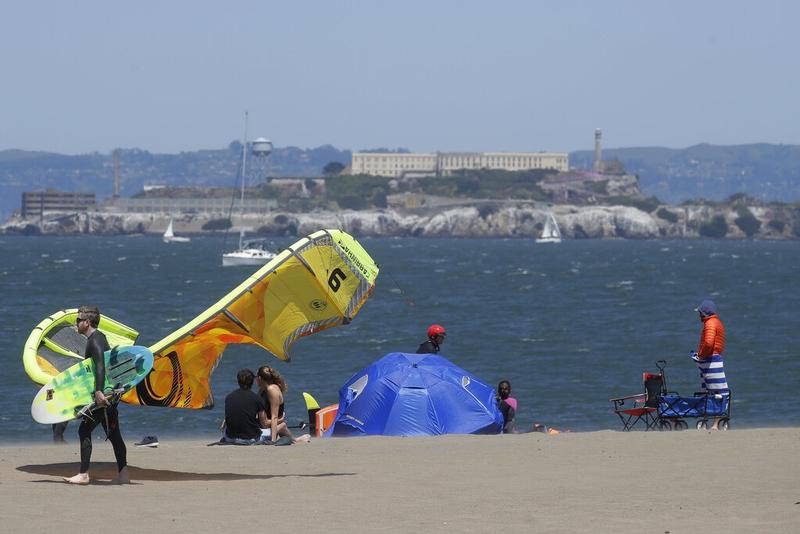 A kiteboarder walks past people sitting on the sand in front of Alcatraz Island, at a Crissy Field East Beach during the coronavirus outbreak in San Francisco, May 3, 2020. (JEFF CHIU / AP)
A kiteboarder walks past people sitting on the sand in front of Alcatraz Island, at a Crissy Field East Beach during the coronavirus outbreak in San Francisco, May 3, 2020. (JEFF CHIU / AP)
NEW YORK / ROME / PARIS / LONDON / QUITO / RIO DE JANEIRO / CAPE TOWN / GENEVA / ATHENS / MEXICO CITY / BELGRADE / SOFIA / OTTAWA / NAIROBI / BERLIN / LIMA / SANTIAGO / MOSCOW / LAGOS / WARSAW - Global confirmed COVID-19 cases topped 3.5 million on Sunday, reaching 3,502,126 as of 7 pm (2300 GMT), according to the Center for Systems Science and Engineering (CSSE) at Johns Hopkins University.
A total of 247,107 people worldwide have died of the disease, according to the CSSE.
The United States, which remains the hardest-hit, reported 1,156,924 cases and 67,498 deaths. Spain and Italy followed with 217,466 cases and 210,717 cases, respectively. Other countries with over 150,000 cases included the United Kingdom, France and Germany.
ALSO READ: Russia's daily cases see steepest jump
UK
The head of the European Union agency for disease control said on Monday Britain was one of five European countries yet to begin a downward trend in its coronavirus outbreak, contradicting the British government’s line.
Andrea Ammon, director of the European Centre for Disease Prevention and Control (ECDC), told EU lawmakers Bulgaria was still recording an increase in cases, while for Britain, Poland, Romania and Sweden the agency had seen “no substantial changes in the last 14 days”.
For all other European countries, there was a drop in cases, she said. “As of Saturday, it appears that the initial wave of transmission (in Europe) has passed its peak,” Ammon told lawmakers in a videoconference.
Another 315 COVID-19 patients have died in Britain, bringing the death toll in the country to 28,446, Minister for the Cabinet Office Michael Gove said Sunday.
The figures include deaths in hospitals, care homes and the wider community.
At Sunday's Downing Street briefing, Gove said that in the coming days, Prime Minister Boris Johnson would talk more about the government's plan on the next step when the lockdown in Britain is eased.
Britain will trial a new coronavirus tracing program next week on the Isle of Wight, just off the south coast of England, Gove said.
Gove also unveiled that the government has pledged an additional 1.6 billion pounds (US$2 billion) to councils across England to support their "essential frontline services" including adult social care.
Co-charing the conference, National Medical Director of NHS (National Health Service) England Stephen Powis told reporters that the peak of hospital admissions has now passed, particularly in London.
Germany
German Chancellor Angela Merkel and premiers of the 16 federal states will on Wednesday discuss coronavirus restrictions for schools, kindergartens and sports, her spokesman said on Monday.
Meanwhile, the country took a further step on the long road back to post-coronavirus normality on Monday, with museums and hairdressers reopening under strict conditions, churches opening their doors for worshippers, and more car factories resuming work although it will extend its border checks until May 15.
Meanwhile, researchers from the University of Bonn have concluded from a field trial in one of the worst hit towns that more than 10 times as many people in Germany have likely been infected with the coronavirus than the number of confirmed cases.
Germany reported the lowest number of new coronavirus infections and deaths since at least March 30, as the country continues an easing of curbs on public life and allows the economy to slowly restart.
There were 697 new cases in Germany in the 24 hours since Sunday, compared with 890 a day earlier, according to data from Johns Hopkins University. The number of confirmed cases now total 165,664.
Fatalities rose by 54 to 6,866, compared with an increase of 76 the day before.
The novel coronavirus reproduction rate in Germany is currently estimated at 0.74 on average, Health Minister Jens Spahn said.
Authorities are watching this rate closely to see whether to loosen coronavirus restrictions further. Public health experts say that a rate of 1 or above would make it harder to loosen restrictions imposed to slow the spread of coronavirus.
Italy
Italy was among a slew of countries easing lockdown restrictions on Monday to resurrect their economies, but officials cautioned against moving too swiftly.
A continuous hum of cars, buses and motorbikes pointed to an increase in early morning commuting, but traffic was still noticeably lighter than before the virus struck in February.
The government has ordered only a gradual revival, giving factories the green light to restart their dormant production lines. It has also said parks can reopen, giving children the chance to run around, while relatives can once again meet up.
However, friends have been told to keep apart and most shops must stay shut until May 18. Restaurants and bars can only offer takeaways, while schools, cinemas and theatres will remain shut for the indefinite future.
 Commuters walk on a platform at the Cardona railway station in Milan, Italy, on May 4, 2020 as Italy starts to ease its lockdown that was imposed to curb the spread of the coronavirus. (MIGUEL MEDINA / AFP)
Commuters walk on a platform at the Cardona railway station in Milan, Italy, on May 4, 2020 as Italy starts to ease its lockdown that was imposed to curb the spread of the coronavirus. (MIGUEL MEDINA / AFP)
Italy's daily new deaths from COVID-19 dropped to 174 on Sunday, the lowest level since the country imposed a lockdown on March 10 to curb the spread of the coronavirus. The new increase pushed the death toll to 28,884.
The numbers of those in intensive care, hospitalization and those recovering at home with symptoms all decreased.
In an interview published Sunday in La Stampa, a daily newspaper from Turin, Prime Minister Giuseppe Conte stressed that the so-called "phase 2" of the lockdown "must not be seen as a signal that we're all free".
Conte said that if indicators continued to improve, he would consider speeding up the reopening in parts of the country least hurt by the pandemic.
He said that "phase 2" would include more testing to see who has the virus, with 5 million kits sent to the regions in the next two months. In addition, from this week some 150,000 blood tests will be carried out to get an idea of how many Italians have already developed antibodies.
Belgium
Belgium began a cautious easing of its coronavirus lockdown on Monday, allowing some businesses to reopen while obliging all passengers on public transport to wear a mask under a new rule to minimise the risk of a new outbreak.
The country of 11.5 million people, among the worst affected by the COVID-19 pandemic, has until now only permitted food shops and pharmacies to operate throughout the crisis, and more recently home-improvement and garden centres.
On Monday, 150,000-300,000 people were expected to resume work in businesses that have no contact with consumers, such as manufacturers, although remote working is still encouraged.
Slovakia
Slovakia will accelerate the reopening of its economy from its coronavirus shutdown as the rate of new infections has slowed, Prime Minister Igor Matovic said on Monday.
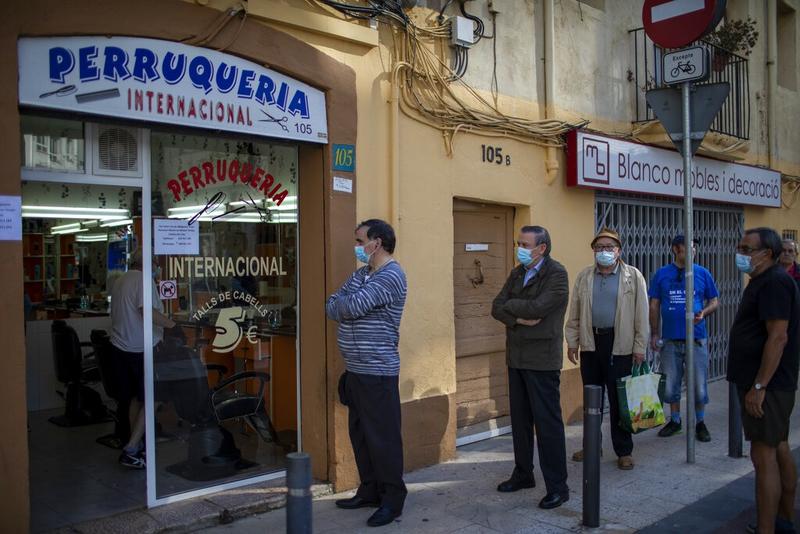 Men wearing face masks line up as they wait to cut their hair at a hair salon in Barcelona, Spain, May 4, 2020. (EMILIO MORENATTI / AP)
Men wearing face masks line up as they wait to cut their hair at a hair salon in Barcelona, Spain, May 4, 2020. (EMILIO MORENATTI / AP)
Spain
With Spain beginning Monday to gradually relax its lockdown regime after weeks of confinement, the country’s daily coronavirus deaths and new cases hovered at lows last seen before the curbs were introduced in early March.
Meanwhile, Spain will pledge 125 million euros (US$136.58 million) to developing a global response to the coronavirus pandemic, Prime Minister Pedro Sanchez said on Monday.
Red Cross workers handed out protective masks at Madrid’s metro station as mask usage in public transport is mandatory as of Monday.
As the 24-hour death tally from coronavirus stayed under 200 for the second day in a row, small businesses like beauty salons and bookstores can start limited services. Customers can pick up take-away orders from restaurants.
The number of fatalities rose by 164 to 25,428 in the 24 hours through Monday, the same increase as Sunday, according to Health Ministry data. Infections rose by 356 to 218,011 after the previous day’s gain of 838. The total number of cases was adjusted to reflect changes in data for the Madrid region.
On four Spanish islands with small populations, shops will be allowed to open with limited capacity.
Ukraine
Ukraine’s government on Monday extended a nationwide lockdown to contain the coronavirus pandemic until May 22 but agreed to partially lift some restrictions from May 11, according to televised cabinet proceedings.
The partial lifting of the restrictions includes opening parks and recreation areas, and allowing some shops, such as those specialising in household goods or textiles, to open. Cafes can reopen for takeaway services.
Ukraine on Monday reported 418 new cases, raising its total to 12,331 with 303 deaths, according to the country's health ministry.
As of Monday, 855 children and 2,387 health workers have been diagnosed with COVID-19, and 1,619 patients have recovered, said the ministry.
A total of 3,662 coronavirus patients have been hospitalized since the beginning of the pandemic, including 412 health workers. Among them, 160 people are on ventilators.
Russia
The number of coronavirus cases in Russia has risen by 10,581 over the past 24 hours compared with a record of 10,633 on the previous day.
This brought Russia's nationwide tally to 145,268, the country's coronavirus crisis response center said on Monday.
It also reported 76 new deaths from COVID-19, bringing the total death toll in Russia to 1,356.
Moscow, the country's worst-hit region, confirmed 5,795 new cases in the past 24 hours, bringing its total to 74,401.
France
President Emmanuel Macron said on Monday France would contribute 500 million euros (US$550 million) to a global fund-raising push to finance research into a vaccine and treatments against the novel coronavirus.
The number of people who have died in France after contracting the new coronavirus rose on Sunday by 135 to 24,895, the health ministry said.
The number of people treated in hospital for the coronavirus and the number of people in intensive care units continued to decline, it said.
A total of 131,287 people have tested positive for the coronavirus since the start of the epidemic, up from Saturday's tally of 130,979 cases.
France is planning to lift it two-month lockdown by gradually opening schools and shops and unwinding restriction on people movement, as a slowdown in the spread of the virus is putting less pressure on hospitals in the last three weeks.
However, the government decided to extend the state of health emergency by another two months to address a possible resurgence of COVID-19 when the lockdown ends on May 11.
Travellers to France who arrive from a country in Europe's Schengen open-border area or Britain will be exempt from a planned compulsory two-week quarantine, the French consulate in Britain said.
Meanwhile, France's state-supported "StopCOVID" contact-tracing app should enter its testing phase in the week of May 11 when the country starts to unwind its lockdown, Minister for Digital Affairs Cedric O said. The minister presented the app as a key element of France's strategy to stave off the coronavirus as authorities grapple with the prospect of mass testing.
Separately, Biomérieux, a French healthcare company specializing in diagnostics, said on Monday it had won 'emergency use authorisation' from the US Food & Drug Administration (FDA) regulator for its product aimed at helping to test for the coronavirus.
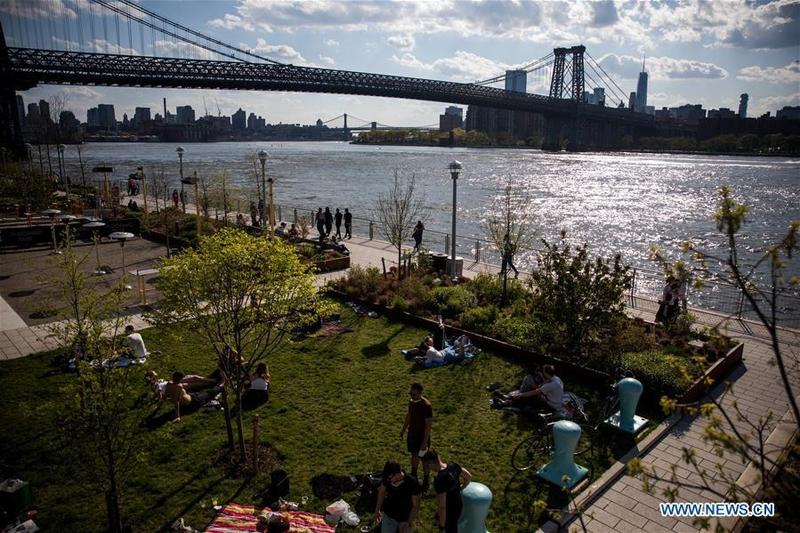 People bask in the sun at a park in New York, the United States, on May 3, 2020. (MICHAEL NAGLE / XINHUA)
People bask in the sun at a park in New York, the United States, on May 3, 2020. (MICHAEL NAGLE / XINHUA)
US
Sunny days and warm weather are proving to be as challenging to manage as restaurants, hair salons and other businesses, as about half of US states partially reopen their economies after the coronavirus lockdown.
READ MORE: Americans begin to surface from isolation as states ease lockdown
On Saturday, thousands of people gathered on the National Mall in Washington to view a US Navy flyover to honor healthcare workers and others battling the pandemic.
In New York City, the warmest weather yet this spring caused picnickers and sunbathers to flock to green spaces in Manhattan, including crowded conditions at the Christopher Street Pier in Greenwich Village, according to photos on social media.
Dr Deborah Birx, response coordinator for the White House coronavirus task force, said on "Fox News Sunday" that massing on beaches was not safe unless people kept at least 1.8 m apart. She also weighed in against allowing such businesses as beauty salons and spas to reopen in the first phase.
"We've made it clear that that is not a good phase one activity," she said, as the number of US cases topped 1.1 million and the death toll rose to more than 67,000 on Sunday.
President Donald Trump said he now believes as many as 100,000 Americans could die in the pandemic, after the death toll passed his earlier estimates, but said he was confident a vaccine would be developed by the year's end.
READ MORE: COVID-19: FDA approves emergency use of remdesivir
Trump also said there had to be more help for Americans suffering from the economic tailspin brought about by the new coronavirus in a possible hint he wants Congress to pass another aid bill.
Poland
The novel coronavirus reproduction rate in Poland is falling and authorities expect it to reach 1 in the coming days, the health ministry said on Monday.
The number is one of several indicators authorities are watching when deciding on loosening coronavirus restrictions for the public. Public health experts say that an R number of 1 or above would make it impossible to loosen.
A health ministry spokesman said that authorities had not seen an increasing number of infections in recent days.
Romania
Romania will not extend a state of emergency past its May 15 expiry date, but will impose a “state of alert” allowing some modest relaxation of restrictions, President Klaus Iohannis said on Monday.
“Unfortunately this epidemics has not yet passed. We need to be responsible and be very cautions further ahead,” Iohannis said, adding that some travel restrictions were lifted but “people won’t be allowed to travel in groups larger than three”.
Nigeria
Nigeria began easing restrictions on Monday in its capital Abuja and in Lagos, its largest city, marking the reopening of Africa's biggest economy after more than four weeks of lockdown.
The regions will now come in line with the rest of the country where the restrictions in force were less strict and include an overnight curfew, mandatory face masks in public and a ban on non-essential interstate travel.
The Nigeria Center for Disease Control (NCDC) has confirmed 170 additional confirmed COVID-19 cases, bringing the total to 2,558.
Two more deaths have been confirmed, bringing the death toll to 87, the NCDC said in a statement late Sunday.
According to the statement, Nigeria has 2,017 active cases of COVID-19, and 400 patients have recovered and were discharged from hospitals.
Chile
Chile reported a total of 1,228 new coronavirus infections in the past 24 hours, taking the country's tally to nearly 20,000, the health ministry said Sunday.
The ministry said 13 more deaths were reported in the South American country, bringing the death toll to 260. Meanwhile, the number of people who have recovered from the disease surpassed 10,000.
According to Health Minister Jaime Manalich, over 80 percent of the newly confirmed cases were concentrated in the capital city of Santiago, the country's major center of infections.
The Chilean government on Sunday announced new quarantine measures in three districts in the capital, as well as the northern city of Antofagasta, to slow down the spread of the disease.
Ecuador
Ecuador has registered a total of 29,538 COVID-19 cases and 1,564 deaths, with 2,074 new cases and 193 more deaths recorded in the last 24 hours, the Ministry of Public Health announced on Sunday.
Minister of Health Juan Carlos Zevallos said that Ecuador has also registered 1,312 deaths that were likely caused by COVID-19.
He added that so far, 78,659 tests have been carried out for the virus.
Ecuador is preparing to relax the government-imposed quarantine starting Monday, transitioning to the social distancing stage in order to gradually reactivate the production and commercial sectors.
Brazil
The Brazilian Ministry of Health reported on Sunday that the number of confirmed COVID-19 cases in the country has exceeded 100,000.
According to the latest epidemiological data, the virus has infected 101,147 people and left 7,025 dead.
Over the last 24 hours, there had been 4,588 new confirmed cases and 275 more deaths.
READ MORE: Bolsonaro leads anti-democratic rally amid raging pandemic
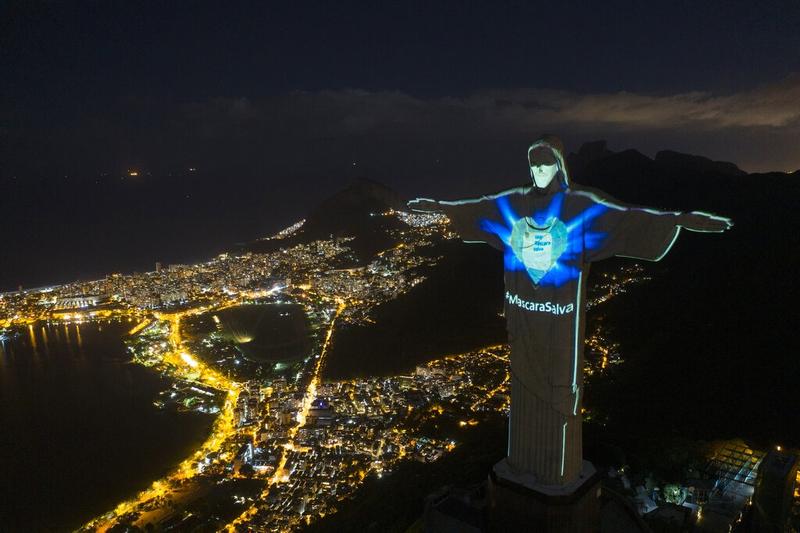 The statue of Christ the Redeemer is lit up "wearing" a protective mask, in Rio de Janeiro, Brazil, May 3, 2020. The message, written in Portugese, illuminated on the statue reads: "Mask saves". (LEO CORREA / AP)
The statue of Christ the Redeemer is lit up "wearing" a protective mask, in Rio de Janeiro, Brazil, May 3, 2020. The message, written in Portugese, illuminated on the statue reads: "Mask saves". (LEO CORREA / AP)
South Africa
South Africa reported on Sunday a sharp surge in the number of confirmed COVID-19 cases, two days after the easing of restrictions following a five-week lockdown.
The total number of confirmed COVID-19 cases in South Africa stood at 6,783, an increase of 447 from Saturday, the country's health minister Zweli Mkhize said in a statement.
This was the highest surge in the 24-hour cycle since March 5, when the country recorded its first case.
Mkhize also said eight more COVID-19 related deaths were reported, bringing the death toll to 131.
The government on Sunday announced strict measures to prevent the spread of COVID-19 at workplaces amid the partial resumption of business.
Those measures include setting up physical barriers at workplaces to ensure social distancing, free provision of appropriate personal protective equipment, screening of workers for COVID-19 symptoms, and isolation and quarantine of workers with related symptoms.
Egypt
Egypt is allowing hotels to reopen for domestic tourists on condition they operate at no more than 25 percent capacity until the end of May and implement a range of other health measures to guard against the new coronavirus, the cabinet said on Sunday.
From June 1, hotels will be allowed to work with a maximum 50 percent capacity, the cabinet said.
The announcement came as the Egyptian health ministry confirmed 272 new cases of COVID-19, bringing the country's tally to 6,465.
Fourteen more deaths were reported Sunday, raising the death toll to 429, the ministry's spokesman Khaled Megahed said in a statement.
Megahed noted that 40 more COVID-19 patients have recovered and were discharged from hospitals, increasing the total recoveries to 1,562.
READ MORE: WHO says you may catch coronavirus more than once
Switzerland
Switzerland reported 88 new confirmed cases of the coronavirus on Sunday, the first time less than 100 cases were reported since two and a half months ago.
According to figures from the Swiss Federal Office of Public Health (FOPH), the total number of COVID-19 now in the country has reached 29,905, and the death toll stands at 1,473.
With some 348 confirmed cases per 100,000 residents and about 170 deaths per million, Switzerland remains one of the most affected countries in Europe.
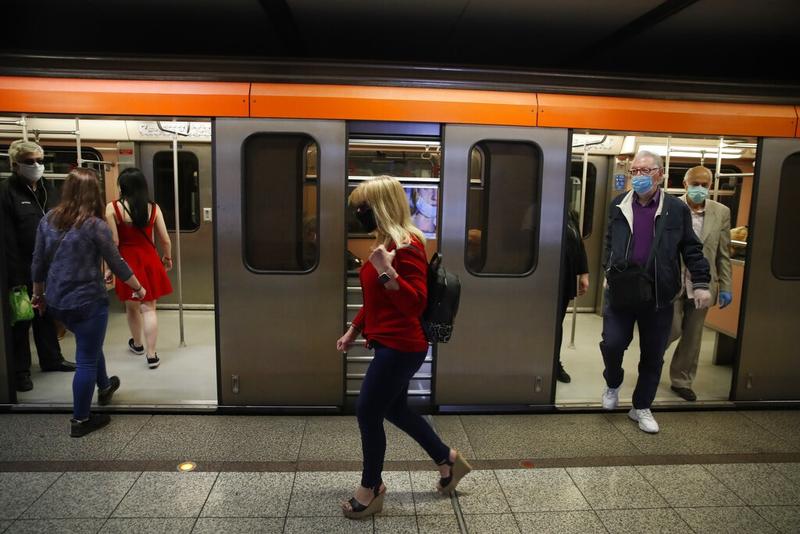 Commuters wearing face masks are seen at Syntagma Metro station during rush hour in central Athens, Greece, May 4, 2020. (THANASSIS STAVRAKIS / AP)
Commuters wearing face masks are seen at Syntagma Metro station during rush hour in central Athens, Greece, May 4, 2020. (THANASSIS STAVRAKIS / AP)
Greece
Greek hair salons, flower shops and bookstores reopened on Monday as part of a gradual easing of lockdown restrictions imposed six weeks ago to curb the spread of the new coronavirus.
From early morning, police carried out inspections on buses and in metro stations to make sure passengers were wearing the mandatory surgical masks and in shops to check whether social distancing rules were being respected.
Greeks no longer need a form stating a valid reason - such as shopping for food or medicine, or taking physical exercise - for permission to leave their homes.
Traffic volumes increased on the streets of Athens and other large cities, and queues formed outside electrical appliance shops, which were also allowed to open for the first time since Greece imposed its tough blanket lockdown in mid-March.
Greece, a country of 11 million people, has so far registered 2,626 cases of COVID-19 and 144 deaths, far fewer than in many other European countries.
Mexico
Mexico's health ministry reported 1,383 new coronavirus cases and 93 more deaths on Sunday, bringing the country's total to 23,471 cases and 2,154 deaths.
Of Mexico's 32 federal entities, only two have registered fewer than 100 cases, deputy health minister Hugo Lopez-Gatell told a news conference.
Serbia
Serbia will end its state of emergency over the coronavirus next week, as the rate of infections has slowed sufficiently, President Aleksandar Vucic said on Sunday.
The lifting of the state of emergency should be ratified by the government-controlled parliament on Wednesday, Vucic said.
The Balkan nation has confirmed 9,464 COVID-19 cases and 193 deaths, but infections have declined to under 5 percent of the thousands of people tested daily, epidemiologists say.
Serbia will next week restart bus and rail services and allow commercial flights later in May.
Shopping malls, cafes and restaurants will also reopen on condition they maintain social distancing.
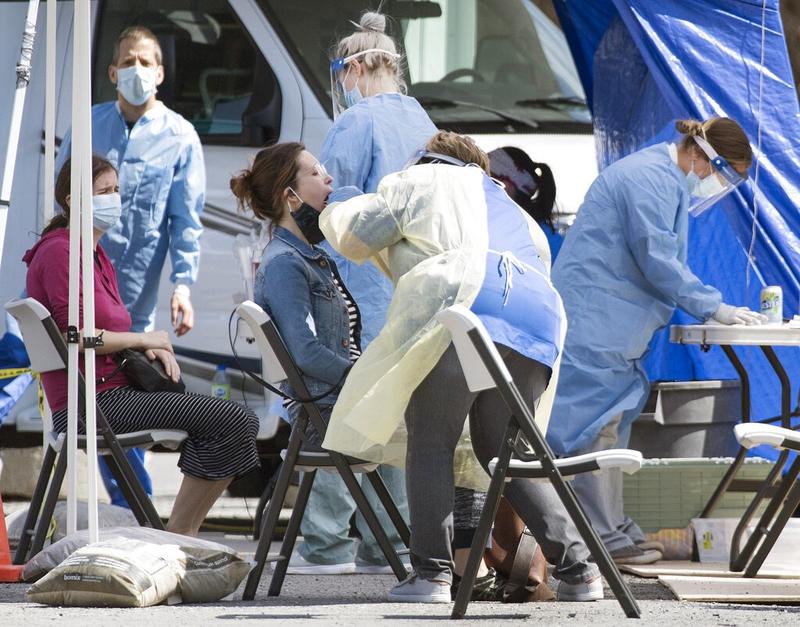 A woman is tested for COVID-19 at a mobile clinic in the Montreal neighborhood of Saint-Michel, Canada, May 3, 2020. (GRAHAM HUGHES / THE CANADIAN PRESS VIA AP)
A woman is tested for COVID-19 at a mobile clinic in the Montreal neighborhood of Saint-Michel, Canada, May 3, 2020. (GRAHAM HUGHES / THE CANADIAN PRESS VIA AP)
Canada
Canada's daily coronavirus death toll edged up by under 5 percent on Sunday in another sign the outbreak has peaked and Prime Minister Justin Trudeau promised additional funding for mental healthcare services.
The total number of people killed by the coronavirus rose by 4.6 percent to 3,606 on Sunday, public health agency data showed.
The figure for those diagnosed with the coronavirus rose to 57,148, the public health agency said.
Trudeau, saying he understood the stress caused by the shutdown of businesses across the country and orders to stay inside, said Ottawa would spend C$240 million (US$170 million) to help develop virtual mental health tools to deliver support digitally.
Morocco
Morocco announced on Sunday 174 new confirmed cases of COVID-19 in the last 24 hours, bringing the country's tally to 4,903.
Mohamed El Youbi, director of epidemiology at the ministry, said 174 people have died from COVID-19 so far.
He said 182 more patients have recovered during the last 24 hours, bringing the total number of recoveries to 1,438.
Senegal
Senegal's Ministry of Health and Social Action announced on Sunday 67 new confirmed cases of COVID-19, bringing the number of cases to 1,182 in the country.
President Macky Sall decided on Saturday night to extend the state of emergency and the curfew from 8 pm to 6 am until June 2.
Kenya
Kenya's Ministry of Health on Sunday confirmed 30 new COVID-19 cases, bringing the total number of infections in the country to 465.
In the past 24 hours, 15 more patients have recovered, bringing the total number of recoveries to 167, said Rashid Aman, chief administrative secretary for the ministry.
Aman also said that two more patients have died, bringing the number of fatalities to 24.
In spite of acquiring testing capacity to undertake mass testing, there is low turnout at testing centers, noted Aman.
Somalia
Somalia's Health Ministry on Sunday confirmed 51 additional cases of COVID-19, bringing the total number of infections to 722.
Health Minister Fawziya Abikar said one patient succumbed to the disease, bringing the total number of facilities to 32.
Netherlands
The number of confirmed coronavirus cases in the Netherlands rose by 199 on Monday to 40,770, with 26 new deaths, health authorities said.
Total deaths in the country rose to 5,082, the Netherlands Institute for Health (RIVM) said in its daily update. The RIVM cautioned that it only reports confirmed cases and deaths, and actual numbers are higher.
Belarus
Belarus reported 877 new confirmed cases of COVID-19 on Sunday, taking its tally to 16,705.
The health ministry said 3,196 patients have recovered, while 99 patients with chronic diseases have died from the pandemic.
Peru
Peru will lift restrictions on mining and other industries this month, the government said in a decree Sunday, as the world’s No 2 copper producer begins to slowly lift lockdown measures.
Mining and metal work, along with tourism, are among industries and services that can restart this month under special safety measures, according to the decree.
Peru has seen 42,534 confirmed cases of the virus in the country - the second most in Latin America. The death toll is now around 1,200.
Measures to contain the pandemic led to an “effective” control of the outbreak, the government said.
Bulgaria
Bulgarian authorities have registered a downward trend in new COVID-19 cases last week, the secretary of the national coronavirus task force Associate Professor Dimo Dimov said in a statement on Monday.
As many as 284 new COVID-19 cases have been registered in the country from April 27 to May 3, while in the period from April 20 to April 26, the figure stood at 433, Dimov said.
However, the number of deaths was 15 and 11 respectively, Dimov said. "This correlates with the observed trend in the world, that when there is an increase in the morbidity rate, there are more deaths in the next seven to 15 days," he said.
A total of 1,632 COVID-19 cases have been confirmed in Bulgaria so far, of which 74 people have died, Dimov said.
On Sunday, Prime Minister Boyko Borissov said checkpoints controlling intercity travel would be most probably removed on Wednesday when Bulgaria marks St George’s Day, Borissov said.
Borissov said more restrictions would be lifted in the coming days. He said that a draft bill regarding lifting the state of emergency will be prepared on Monday.
Senegal
Senegalese Ministry of Health and Social Action announced on Monday 89 new confirmed cases of COVID-19, bringing the total number of confirmed cases to 1,271 in the country.
Out of 807 tests carried out in the past 24 hours, 89 returned positive, the ministry said in a press release, adding that 86 are follow-up contact cases and three are community transmission cases.
A total of 43 patients are declared negative after receiving treatments, while six patients are now in intensive care units.
Senegal also confirmed earlier this morning another death due to COVID-19, a 58 years old male.
Tanzania
Coronavirus test kits used in Tanzania were dismissed as faulty by President John Magufuli on Sunday, because he said they had returned positive results on samples taken from a goat and a pawpaw.
Magufuli, whose government has already drawn criticism for being secretive about the coronavirus outbreak and has previously asked Tanzanians to pray the coronavirus away, said the kits had “technical errors”.
Sudan
Sudan on Monday announced 86 new infections with COVID-19, bringing the total confirmed cases in the country 678.
Meanwhile, nine more cases have recovered, taking the recoveries to 61, and the death toll remained at 41, according to a statement by the Sudanese health ministry.
The ministry urged the citizens to abide by the preventive guidelines and immediately report suspected cases.


